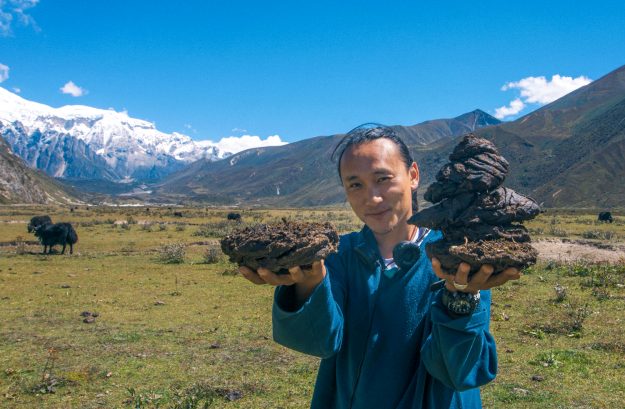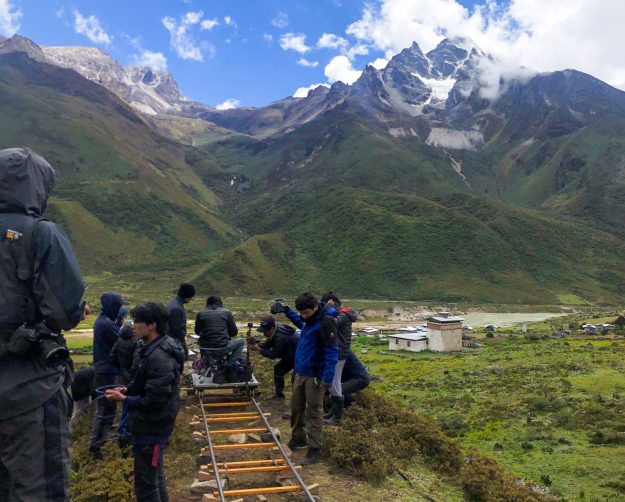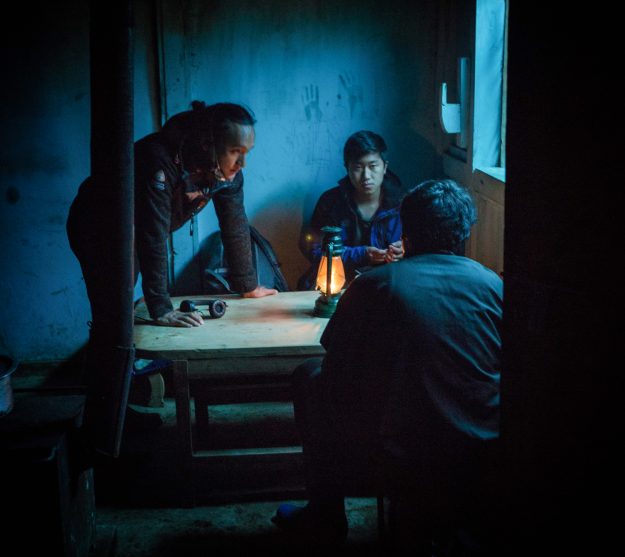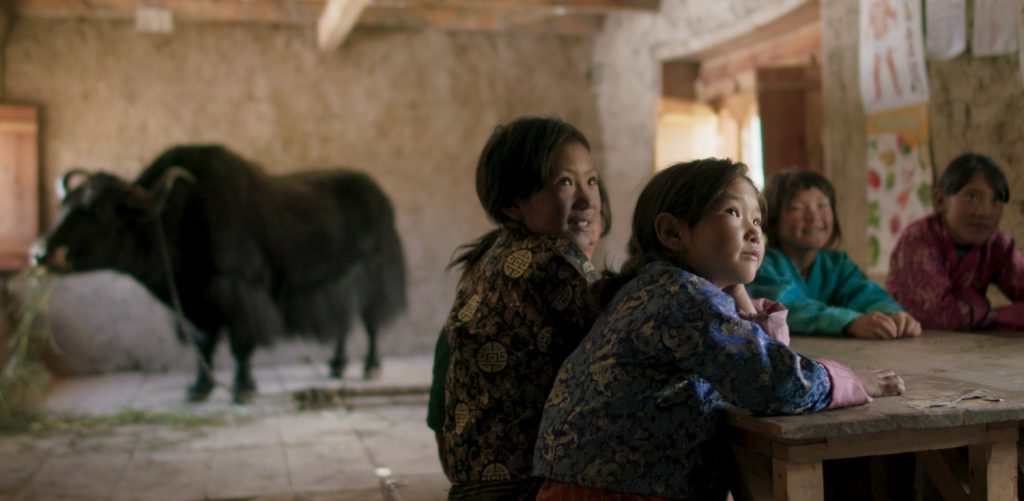At an altitude of 15,000 feet above sea level, in a small hamlet without electricity or running water, one of the world’s most remote schools has recently gained international attention. The school, set in Bhutan’s Lunana valley, is the subject of filmmaker Pawo Choyning Dorji’s debut feature, Lunana: A Yak in the Classroom, and the recipient of Bhutan’s first Oscar nomination. Lunana is up for Best International Feature Film at the 94th Academy Awards, which will be held on March 27.
At heart, Lunana is a story about the search for belonging. Despite Bhutan’s emphasis on Gross Domestic Happiness, an index that measures the collective happiness of the Himalayan kingdom, many of its youth yearn to travel beyond the country’s snow-capped peaks to explore the Western world. Protagonist Ugyen Dorji (Sherab Dorji) epitomizes this struggle. The teacher and aspiring singer hopes to emigrate to Australia, but is instead assigned to a teaching post deep in the mountains of Lunana, literally the “dark valley,” where toothpaste is an exotic import and yak dung a valuable commodity.
“Can we find within the darkness what we seek in the light?” Pawo Choyning Dorji asks with his film. Judging by Lunana’s breakout success, the answer seems to be a resounding yes. From his home in Taiwan, Dorji spoke with Tricycle about what inspires his storytelling, what he learned from going into the shadows of the “dark valley,” and what we can expect from him next.

Sanjna N. Singh: What was the best reaction you received upon learning that Lunana had been nominated for Best International Feature?
Pawo Choyning Dorji: This is the first time in history a film from Bhutan has been nominated for an Academy Award, so it has captivated the nation. The film has also caught the heart of other Himalayan communities. Nepalese and Sikkimese filmmakers are messaging me to say, “I can’t talk properly because my emotions are getting caught in my throat.” Tibetan youngsters are discussing the film in coffee shops. (I don’t want to think about how they are viewing it, though, because it’s not supposed to be there yet!)
If I were to single out one reaction, it would be a message from a lama at a monastery in Bhutan where I do a lot of work. Someone had explained to him what the Oscars are and how significant this is. He offered all that he could, which was one kilo of cow butter and 50 rupees, to a statue of Guru Rinpoche, and made the aspiration that we will continue to carry Bhutan’s name forward.
SNS: You shot the film in one of the most isolated villages in the world, but by the time you presented it, the world itself had gone into isolation due to the pandemic. How did this global isolation force you to rethink how to present or position Lunana?
PCD: Although Lunana is linguistically, culturally, and geographically very different from anything most of the world has seen, it touches on a universal human theme of seeking where you belong—of home and happiness. And I think that’s what impacted people. Because when COVID-19 started, there was a lot of suspicion, separation, and isolation. And here is this film that is very simple and touches on what everyone is yearning for.
When it made the Oscars shortlist I asked my agent, how is this even possible? And he said that we are living in difficult times, the film is uplifting, and when it’s over you remember it more than the depressing movies. So I’m really happy that the film has been able to do this.

SNS: It’s also interesting that as the world was going into isolation, Lunana’s isolation was ending. Can you explain that?
PCD: When I was filming, there was a part of me that wondered, am I doing the right thing? Lunana is one of the last untouched settlements in the world. Maybe I should just let the village be. Do I have a right to share their lives? Because once I do, that innocence is gone. But, just as we were about to leave, a telecom company came to install the first cellular tower, and that was a bittersweet moment for me. Of course, with modern facilities, life will get better for them. But this purity will be gone. In fact, it has already happened. The day before yesterday I got a message from Pem Zam, a young student featured in Lunana. She has a Facebook account now. So, these beautiful stories will now be replaced by, you know, TikTok.
SNS: I’ve heard that every film is an extension of the filmmaker. How much of yourself is present in your work?
PCD: There is a lot of me in the Ugyen character. I am someone who grew up in America, Europe, and the Middle East, and I came back to Bhutan at just the right moment because I was old enough to appreciate the Bhutanese way of life. I shared Ugyen’s sense of opening to this beautiful world, and his realization that his culture and traditions have so much to teach him.
I also tried to put my own experiences in the film. I was attending [Dzongsar Khyentse] Rinpoche and we were hiking high up in the mountains. It rained the whole way. It was wet, rocky, and icy. We took shelter in a yak herder’s tent and he served us warm yak milk. The herder was barefoot, his feet full of calluses and cracks. I asked him, “Why aren’t you wearing shoes?” And he said, “I need to spend my money on essentials.” Then his son came in, wearing rain boots. That really hit my heart. The father and son rain scene in Lunana is based on that. [In the film, on the way to Lunana, Ugyen stops at a guest house where his host, Phurba (Dophu), has no shoes on. Phurba tells Ugyen he is used to going barefoot and has no money for shoes. Then Phurba’s son walks up, wearing new-looking rain boots.] When you talk about parental sacrifice, this is the Bhutanese way of life that many are forgetting.

SNS: In addition to the physical hardship of filming at an altitude of over 15,000 feet above sea level, this remote location also posed technical issues. How did that impact your filmmaking?
PCD: With Lunana being so far from civilization, it was almost like traveling back in time. There were no modern facilities, so we had to rely on solar batteries and chargers. But some days there was no sun. So we shot on one camera, and only charged what was essential—camera and sound of course—and used computers to transfer the footage. This meant that I couldn’t watch dailies [raw, unedited footage]. I had no idea how anything looked, until two months later, when I was in the editing room. I told my crew that if the film is an utter failure we can take pride that we made a film with zero carbon footprint! But those kinds of limitations forced me to be very meticulous about what I was shooting.
SNS: I hear you’re working on a new film. If the core of Lunana was the search for contentment, home, and belonging, what is the emotional heartbeat of this new film?
PCD: Bhutan is unique because we were in self-isolation for the better part of the last century. Television and internet only happened in the early 2000s. Suddenly you wake up and a television set has become a status symbol. People sold their cows and their yaks for TV sets. This new story takes place during this time. It’s about change and transition.
SNS: Why is this storyline of change and transition important to you?
PCD: One time I was hiking in Lunana and this man told me, “When I was young, there was snow and ice all over the mountain, but now every year it’s becoming less and less.” And I said “Oh it’s global warming.” He said, “I don’t know what global warming is, but this is the home of the snow lion. And the snow lions are disappearing from the world.”
And I realized the wisdom of this because what he’s saying is that the heart of enlightenment is disappearing because of over-consumption, because of putting our wants ahead of our needs. There’s so much wisdom there. It is in our constitution that the purpose of the government is to provide happiness for citizens. The whole idea of Gross National Happiness, which actually refers to contentment, is built upon that. As we modernize, we are losing that.
So the new project is about us as a society trying to find our own place in this modern world, including what’s being gained and what’s being lost.
SNS: I remember watching a rough cut of Lunana on your laptop in Dehradun, India, years ago. I’m thrilled by how far it’s come!
PCD: It’s been surreal. You know, in Bhutan, when we say “tell me a story,” we actually say “untie a knot for me.” So stories have this higher purpose, this untying and liberating purpose. They are supposed to teach people about themselves, and about the world they live in. They’re supposed to bring people closer to enlightenment. So I hope this film’s success will inspire more storytellers and more artists from Bhutan to share their stories.
♦
Thank you for subscribing to Tricycle! As a nonprofit, we depend on readers like you to keep Buddhist teachings and practices widely available.
